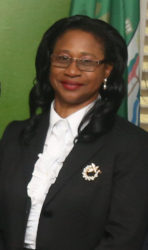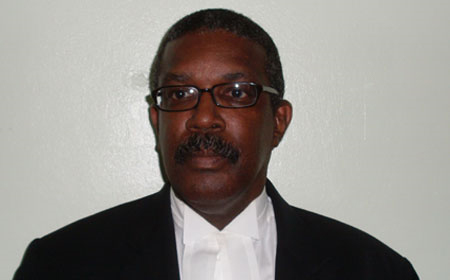Though he had said that he would seek legal advice on the impasse over the top two appointments to the judiciary, President David Granger on Wednesday said that the ball was now in the court of the Opposition Leader, Bharrat Jagdeo.
President Granger has not disclosed what legal advice he received on the way forward. Jagdeo insists that it is up to Granger to inform him of the way forward. Since his letter of rejection was delivered to the president’s office, Jagdeo said he has heard nothing about the likelihood of further consultations.
“The ball is in the court of the Leader of the Opposition. I have made my proposals to him, he simply rejected them. He has not made any counterproposals so there is nothing to discuss”, the President told reporters during a brief interview following the conclusion of the opening ceremony of the Caribbean Financial Action Task Force (CTATF) workshop for judges and prosecutors.

Granger in January informed Jagdeo that his choice for Chancellor of the Judiciary was Belizean Chief Justice Kenneth Benjamin, while acting Chancellor Yonette Cummings-Edwards was his nominee for Chief Justice. The two met on the issue and Jagdeo at that forum asked for some time to deliberate on the matter. On February 7th, 2018, by way of letter, Jagdeo informed Granger of his disagreement with the nominees.
Article 127 (1) of the Constitution states that both sides must agree on the nominees before the substantive appointments can be made. “The Chancellor and the Chief Justice shall each be appointed by the President, acting after obtaining the agreement of the Leader of the Opposition,” it states.
Granger stated on Wednesday that he had hoped that they would have been able to move forward and “make substantive appointments at this stage but I have to depend on his compliance”.
Since Jagdeo rejected the two nominees, observers have noted that it is the President who should initiate the next step either making different recommendations or further discussing with the Opposition Leader the original nominees.
Days after the rejection, Granger had said “Well, I have to be advised by my Minister of Legal Affairs and Attorney General. We cannot be without a Chancellor and Chief Justice and right now two persons are acting and I had hoped that we could have moved forward by having a substantive or a full time appointment agreed but this has not happened and the constitution requires me to await the approval of the Leader of the Opposition. [That] hasn’t come, so I would have to depend on legal advice and make sure that the courts continue to function”.
When asked on Wednesday about the legal advice sought, Granger responded “I know what needs to be done. I am well advised but I have to wait on the Leader of the Opposition to respond to my proposals”.
Worried
On February 19, apparently worried that unilateral appointments would be made, the Guyana Bar Association (GBA) issued a statement saying that any such action would have embarrassing consequences.
Noting that the appointments of the Chancellor and the CJ were governed by Article 127 of the Constitution, the GBA said “Any action outside of the said Article 127 is unconstitutional, void, of no legal effect and would have embarrassing consequences.
“The current climate surrounding the offices of the Chancellor and Chief Justice is repugnant and shakes the public confidence in the legal system. It further unfairly undermines the dignity of the offices and office holders.
“In the circumstances we urge the Parties to work to break the impasse and arrive at a consensual resolution, discharging their duties to the nation and in keeping with the spirit and intent of Article 127 of the Constitution which was amended from its original form to foster collaboration.”
Both the Minister of State, Joseph Harmon and Attorney General Basil Williams SC recently said that it is up to the president to comment on the legal advice he had sought.
Justice Cummings-Edwards and acting Chief Justice Roxane George were appointed last year, weeks after the retirement of then acting Chancellor Carl Singh. Chancellor Singh was the acting head of the Judiciary for about 12 years. Granger, the then Opposition Leader had refused to agree to Chancellor Singh’s substantive appointment saying that that position as well as the Chief Justice’s post must first be advertised in the interest of transparency before there is any confirmation. The then PPP/C government had argued that such a process was not catered for.
The situation has attracted public expressions of concern from leading judicial minds.
Caribbean Court of Justice (CCJ) President Sir Dennis Byron a week ago reiterated the importance of having substantive judicial appointments and called for the impasse between Granger and Jagdeo to be resolved soonest.
“It is much too long for a country to be without a Chancellor and a Chief Justice and I think it’s important for that situation to be suspended as soon as possible,” Sir Dennis had told the Sunday Stabroek shortly after delivering a lunchtime keynote address at the 3rd International Conference on Commercial Arbitration.
Asked what should be done in this situation, Sir Dennis said that from the time he assumed the leadership of the final court, he has stressed that it is important that the constitutional expectations—that there is an appointed Chancellor of the Judiciary and Chief Justice—are realised.
With regards to whether Guyana ought to be reforming the law to deal with situations like the current impasse, Sir Dennis had noted that he expressed his opinion on this during the 37th Annual Bar Association Dinner held last November.
“If it is thought that there needs to be a change in the legislative framework, then those responsible should change the laws but it might not be necessary in order to achieve the required objectives. It might be that within the framework of existing legislation there are solutions that could be found and that is the view I expressed”, he had said.
While delivering the keynote address at the dinner, the CCJ head had said it was disappointing that no substantive Chancellor has been appointed after Justice Desiree Bernard’s departure and noted that having both offices being led by judges acting in respective capacities is “a most unfortunate state of affairs.”
He had bemoaned the inability of successive presidents and opposition leaders to agree on appointing a substantive Chancellor of the Judiciary, while warning that prolonged acting appointments pose a genuine “risk” to the promise to citizens of an independent and impartial judiciary.






